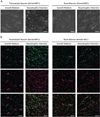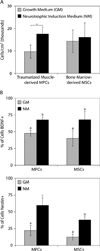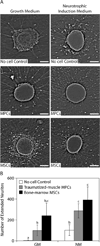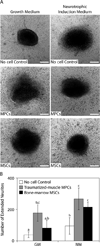Mesenchymal progenitor cells derived from traumatized muscle enhance neurite growth
- PMID: 22552971
- PMCID: PMC4058789
- DOI: 10.1002/term.539
Mesenchymal progenitor cells derived from traumatized muscle enhance neurite growth
Abstract
The success of peripheral nerve regeneration is governed by the rate and quality of axon bridging and myelination that occurs across the damaged region. Neurite growth and the migration of Schwann cells is regulated by neurotrophic factors produced as the nerve regenerates, and these processes can be enhanced by mesenchymal stem cells (MSCs), which also produce neurotrophic factors and other factors that improve functional tissue regeneration. Our laboratory has recently identified a population of mesenchymal progenitor cells (MPCs) that can be harvested from traumatized muscle tissue debrided and collected during orthopaedic reconstructive surgery. The objective of this study was to determine whether the traumatized muscle-derived MPCs exhibit neurotrophic function equivalent to that of bone marrow-derived MSCs. Similar gene- and protein-level expression of specific neurotrophic factors was observed for both cell types, and we localized neurogenic intracellular cell markers (brain-derived neurotrophic factor and nestin) to a subpopulation of both MPCs and MSCs. Furthermore, we demonstrated that the MPC-secreted factors were sufficient to enhance in vitro axon growth and cell migration in a chick embryonic dorsal root ganglia (DRG) model. Finally, DRGs in co-culture with the MPCs appeared to increase their neurotrophic function via soluble factor communication. Our findings suggest that the neurotrophic function of traumatized muscle-derived MPCs is substantially equivalent to that of the well-characterized population of bone marrow-derived MPCs, and suggest that the MPCs may be further developed as a cellular therapy to promote peripheral nerve regeneration.
Copyright © 2012 John Wiley & Sons, Ltd.
Figures






References
-
- Bossolasco P, Cova L, Calzarossa C, et al. Neuroglial differentiation of human bone marrow stem cells in vitro. Exp Neurol. 2005;193:312–325. - PubMed
-
- Brohlin M, Mahay D, Novikov LN, et al. Characterisation of human mesenchymal stem cells following differentiation into Schwann cell-like cells. Neurosci Res. 2009;64:41–49. - PubMed
-
- Bulken-Hoover JD, Jackson WM, Ji Y, et al. Inducible expression of neurotrophic factors by mesenchymal progenitor cells derived from human muscle after traumatic injury. Mol Biotechnol. 2011 - PubMed
-
- Caddick J, Kingham PJ, Gardiner NJ, et al. Phenotypic and functional characteristics of mesenchymal stem cells differentiated along a Schwann cell lineage. Glia. 2006;54:840–849. - PubMed
-
- Caplan AI. Adult mesenchymal stem cells for tissue engineering versus regenerative medicine. J Cell Physiol. 2007;213:341–347. - PubMed
Publication types
MeSH terms
Substances
Grants and funding
LinkOut - more resources
Full Text Sources
Other Literature Sources
Medical

